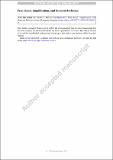Free choice, simplification, and Innocent Inclusion
Author(s)
Bar-Lev, Moshe E.; Fox, Daniel
Download11050_2020_9162_ReferencePDF.pdf (544.6Kb)
Open Access Policy
Open Access Policy
Creative Commons Attribution-Noncommercial-Share Alike
Terms of use
Metadata
Show full item recordAbstract
We propose a modification of the exhaustivity operator from Fox (in: Sauerland and Stateva (eds) Presupposition and implicature in compositional semantics, Palgrave Macmillan, London, pp 71–120, 2007. https://doi.org/10.1057/9780230210752_4) that on top of negating all the Innocently Excludable alternatives affirms all the ‘Innocently Includable’ ones. The main result of supplementing the notion of Innocent Exclusion with that of Innocent Inclusion is that it allows the exhaustivity operator to identify cells in the partition induced by the set of alternatives (assign a truth value to every alternative) whenever possible. We argue for this property of ‘cell identification’ based on the simplification of disjunctive antecedents and the effects on free choice that arise as the result of the introduction of universal quantifiers. We further argue for our proposal based on the interaction of only with free choice disjunction.
Date issued
2020-03Department
Massachusetts Institute of Technology. Department of Linguistics and PhilosophyJournal
Natural Language Semantics
Publisher
Springer Science and Business Media LLC
Citation
Bar-Lev, Moshe E. and Danny Fox. "Free choice, simplification, and Innocent Inclusion." Natural Language Semantics 28, 3 (September 2020): 175–223 © 2020 Springer Nature B.V.
Version: Author's final manuscript
ISSN
0925-854X
1572-865X